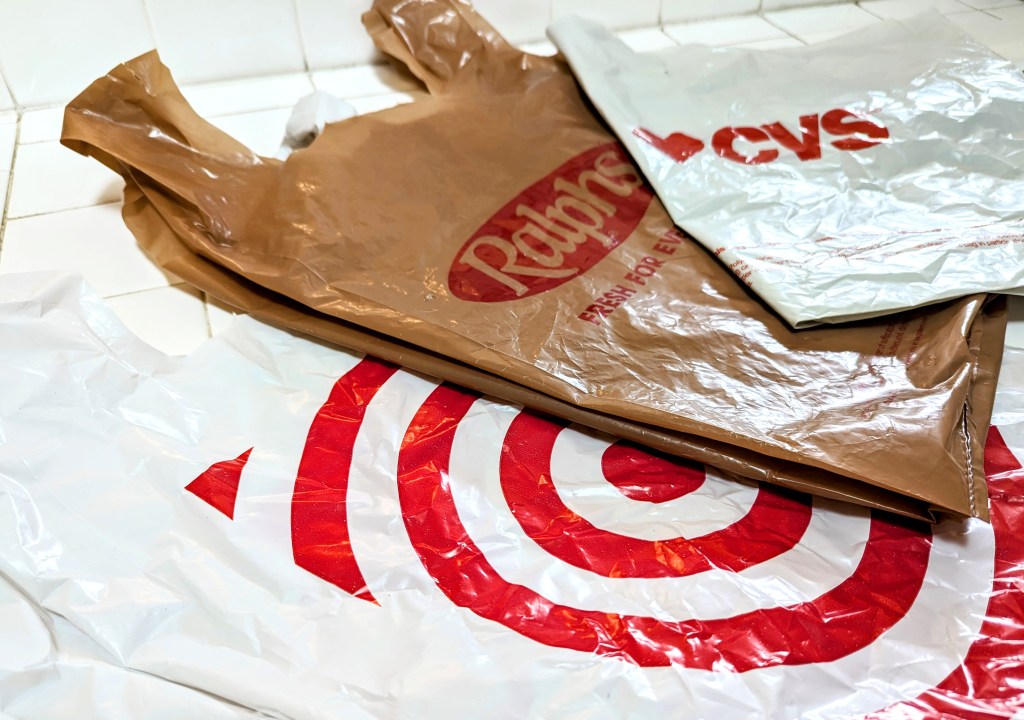More than 230,000 tons of plastic waste. That’s the weight of discarded plastic bags Californians threw away in 2021.
With numbers like these, it’s clear California’s plastic bag ban isn’t working as intended. Two bills in the state Legislature could change that by truly banning plastic bags in grocery store checkout lanes.
Voters made it clear that they don’t want plastic bags in grocery stores when they approved Proposition 67 in 2016, affirming a statewide ban on single-use plastic grocery bags.
But the plastic industry quickly exploited the law, inventing thicker plastic bags that they claim meet the law’s definition of a reusable bag and are therefore exempt. The reality is, most of these bags are neither reused nor recycled statewide.
Plastic bags are typically only used for a few minutes and discarded after the short trip home from the grocery store. Rarely do these bags get recycled. Most, if not all, of CalRecycle’s waste management centers don’t even accept plastic bags for recycling. The few bags that make it to a specialized center aren’t recycled back into plastic bags but are “down-cycled” into other products, such as plastic park benches. This process doesn’t address the root of the problem: reducing the number of plastic bags made each year.
Globally, we dump two garbage trucks worth of plastic into the ocean every minute. Plastic bags are among the most common types of plastic waste consumed by or entangling marine animals, including the endangered Pacific leatherback sea turtles, whales and dolphins. As this plastic breaks down, it never disappears. Instead, it breaks into smaller pieces called microplastics. Microplastics are now found nearly everywhere, from the top of Mt. Everest to the bottom of the Mariana Trench and even inside our bodies.
Because we can’t recycle plastic bags, billions of new ones are made yearly. Plastics are primarily made from fossil fuels, so producing more plastic bags requires more drilling for oil, gas and coal. Extracting and refining fossil fuels releases toxic substances into the air, including known carcinogens and neurotoxins, and contributes to climate change. In 2019, plastics were responsible for 1.8 billion tons of greenhouse gas emissions.
Plastic bags also carry a massive waste-management price tag. Every year, Californians are footing the nearly $420 million bill to keep plastic from littering our oceans, beaches and waterways, plus $6.7 million in street sweeping and manual land litter cleanup costs. Fixing the state bag ban is an environmental imperative and an economic no-brainer.
Californians know how bad plastic bags are. That’s why the state banned them in 2014, and voters defended the law on the ballot in 2016.
Now, two bills in the legislature will finally grant Californians the outcome they have wanted: plastic bag-free grocery stores. If passed, state Sen. Catherine Blakespear’s SB 1053 and Assemblymember Rebecca Bauer-Kahan’s AB 2236 would prohibit plastic bags from being provided at grocery checkout lanes and change the definition of “reusable bag,” ensuring plastic film bags are no longer considered “reusable.”
This legislation would finally remove plastic bags from the grocery store landscape. The goal is to encourage people to shop with their own reusable bags and use them over and over again. If they forget their bag, paper bags will still be provided for a small fee. Unlike plastic bags, paper bags can be recycled statewide and are even compostable.
Since California is the most populous state in the nation, cutting plastic bags will significantly reduce the flow of plastic waste into our environment and curtail the need to create more plastic. It’s time to get rid of single-use plastic grocery bags once and for all by passing SB 1053 and AB 2236.
Laura Deehan is state director of the environmental advocacy group Environment California and lives in Richmond. Fiona Hines is a legislative advocate for the advocacy group CALPIRG.
